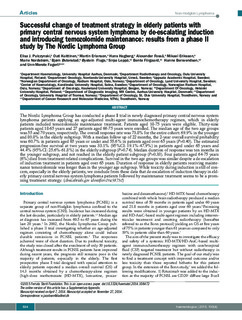| dc.contributor.author | Pulczynski, Elisa J. | |
| dc.contributor.author | Kuittinen, Outi | |
| dc.contributor.author | Erlanson, Martin | |
| dc.contributor.author | Hagberg, Hans | |
| dc.contributor.author | Fosså, Alexander | |
| dc.contributor.author | Eriksson, Mikael | |
| dc.contributor.author | Nordström, Marie | |
| dc.contributor.author | Østenstad, Bjørn | |
| dc.contributor.author | Fluge, Øystein | |
| dc.contributor.author | Leppä, Sirpa | |
| dc.contributor.author | Fiirgaard, Bente | |
| dc.contributor.author | Bersvendsen, Hanne | |
| dc.contributor.author | Fagerli, Unn-Merete | |
| dc.date.accessioned | 2019-11-22T08:26:54Z | |
| dc.date.available | 2019-11-22T08:26:54Z | |
| dc.date.created | 2015-07-07T15:00:09Z | |
| dc.date.issued | 2015 | |
| dc.identifier.citation | Haematologica. 2015, 100 (4), 534-540. | nb_NO |
| dc.identifier.issn | 0390-6078 | |
| dc.identifier.uri | http://hdl.handle.net/11250/2629972 | |
| dc.description.abstract | The Nordic Lymphoma Group has conducted a phase ll trial in newly diagnosed primary central nervous system lymphoma patients applying an age-adjusted multi-agent immunochemotherapy regimen, which in elderly patients included temozolomide maintenance treatment. Patients aged 18–75 years were eligible. Thirty-nine patients aged 18–65 years and 27 patients aged 66–75 years were enrolled. The median age of the two age groups was 55 and 70 years, respectively. The overall response rate was 73.8% for the entire cohort: 69.9% in the younger and 80.8% in the elderly subgroup. With a median follow up of 22 months, the 2-year overall survival probability was 60.7% in patients aged 65 years or under and 55.6% in patients aged over 65 years (P=0.40). The estimated progression-free survival at two years was 33.1% (95%CI: 19.1%–47.9%) in patients aged under 65 years and 44.4% (95%CI: 25.6%–61.8%) in the elderly subgroup (P=0.74). Median duration of response was ten months in the younger subgroup, and not reached in the elderly patient subgroup (P=0.33). Four patients aged 64–75 years (6%) died from treatment-related complications. Survival in the two age groups was similar despite a de-escalation of induction treatment in patients aged over 65 years. Duration of response in elderly patients receiving maintenance temozolomide was longer than in the younger age subgroup. While toxicity during induction is still of concern, especially in the elderly patients, we conclude from these data that de-escalation of induction therapy in elderly primary central nervous system lymphoma patients followed by maintenance treatment seems to be a promising treatment strategy. (clinicaltrials.gov identifier:01458730) | nb_NO |
| dc.language.iso | eng | nb_NO |
| dc.publisher | Ferrata Storti Foundation | nb_NO |
| dc.title | Successful change of treatment strategy in elderly patients with primary central nervous system lymphoma by de-escalating induction and introducing temozolomide maintenance: results from a phase II study by the Nordic Lymphoma Group | nb_NO |
| dc.type | Journal article | nb_NO |
| dc.type | Peer reviewed | nb_NO |
| dc.description.version | publishedVersion | nb_NO |
| dc.source.pagenumber | 534-540 | nb_NO |
| dc.source.volume | 100 | nb_NO |
| dc.source.journal | Haematologica | nb_NO |
| dc.source.issue | 4 | nb_NO |
| dc.identifier.doi | 10.3324/haematol.2014.108472 | |
| dc.identifier.cristin | 1252849 | |
| dc.description.localcode | © 2015 Ferrata Storti Foundation.This is an open-access paper. | nb_NO |
| cristin.unitcode | 1920,12,0,0 | |
| cristin.unitcode | 194,65,15,0 | |
| cristin.unitname | Kreftklinikken | |
| cristin.unitname | Institutt for klinisk og molekylær medisin | |
| cristin.ispublished | true | |
| cristin.fulltext | original | |
| cristin.qualitycode | 1 | |
